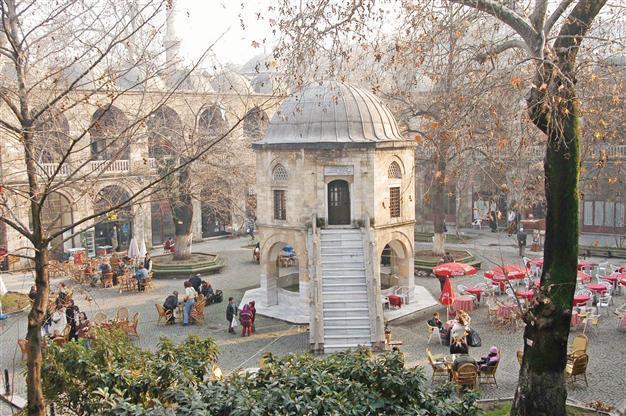Turkey to initiate Silk Road workshop
ISTANBUL- Hürriyet Daily News

This file photo shows the Koza Han, a traditional silk trade and production center in Bursa, the northwestern Turkish province on the historic route of the Silk Road. Hürriyet photo
Turkey plans to organize the Meeting of the Joint Black Sea Economic Cooperation (BSEC) Working Groups on Cooperation in Tourism and on Culture, along with the Conference on the Silk Road in September, according to an official from the Tourism Ministry. Leading international institutions, including the World Tourism Organization (UNWTO), the United Nations Educational, Scientific and Cultural Organization (UNESCO), the Economic Cooperation Organization (ECO) and the Joint Administration of Turkic Arts and Culture (TÜRKSOY) are expected to attend the events.
The Silk Road has been moved to the front burner again due to recent global developments and a summit organized by an organization which brings countries in the Black Sea region together in Istanbul.
The BSEC Foundation’s 20th anniversary will be marked by the State and Government Heads Summit today in Istanbul under the co-presidencies of Turkey and Serbia. Turkey will preside over the BSEC for six months between July 1 and Dec. 31.
New projects are under way and works are continuing to revitalize the historical trade route. Networks of roads will be built stretching from China to Europe within the scope of the Transport Corridor Europe-Caucasus-Asia (TRACECA) program. The Rail Silk Road Project is one such work. International funds support research on the Silk Road in the Caucasus and Central Asia. Cultural studies regarding the Silk Road will create coherence in this field.
Projects for cooperation
The Black Sea region, which is the main area of activity of the BSEC, provides great opportunities. The Turkish Culture and Tourism Ministry has suggested several projects that support cooperation between the members of the Culture Study group as part of the BSEC since 2008. The ministry has issued a call for other countries to participate in a project titled “the Silk Road Project in the Black Sea Region.”
The geographical scope of the project consists of a corridor starting from the northern province of Trabzon passing through the Zigana Pass to Gümüşhane and then to the eastern provinces of Bayburt, Erzurum, Kars and Ağrı.
The goal of the project is to unearth the old cultural routes, to document, protect and carry out necessary maintenance and repairs of the cultural values along this corridor. Another goal is to organize events in the region to develop the intercultural dialogue that this region has maintained throughout its past to today’s modern age. The project also aims to ensure long-term protection and development in a balanced way.
Historical significanceThe Silk Road was the most ancient and powerful trading route in world history. Comprised of a network of roads that stretched all the way from Europe to China, the Silk Road contains roads which trace varying routes in the region from different eras with respect to geographical features. One of the routes was the Black Sea Silk Road. Stretching from the Caucasus to Anatolia, through the north of the Black Sea to Europe, The Black Sea Silk Road is also called the North Silk Road.
The region witnessed an intense period of trade thanks to the historical Silk Road. The cultural exchanges made along the route were also historically significant as the primary exchange of merchandise. Cultural exchanges caused a strong interaction and social communication between communities. Bringing out traces of these historical interactions will enable the people of the region to get closer and pave the way for establishing dialogue between them.
The theme of the Silk Road is a powerful tool to make this happen, and Turkey is one of the most important spots along the Silk Road. The Turkish migration from Central Asia, which began with the Seljuks in the Middle Ages, led to the birth of a civilization. Today Seljuk caravanserais on the Silk Road are among the most important historical monuments in Anatolia. Now close to 800-years-old, these buildings still indicate the power of the Silk Road.
